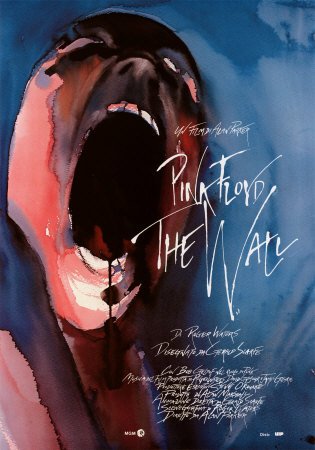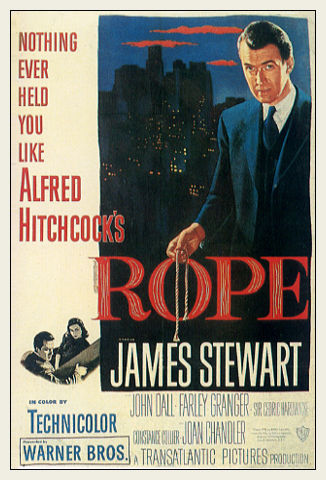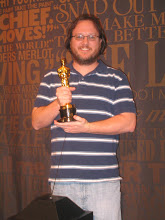Usually every summer I use the big event movies as an excuse to get together with a large group of friends. We would meet for dinner and then get in line for whatever the big release is for that weekend. Part of the fun was sticking around afterwards and talking about the movie, but mostly it was just about getting together with some friends that I don't get to see too often anymore.
By now we would have met up for four weeks in a row and I would have seen many of the movies already. With so much going on in my life this Summer it just hasn't happened yet. I got to see Star Trek at an early screening so there went that weekend. But the other films haven't really gotten me excited about going to the movies. It's pretty sad really.
This past weekend I played some catch up and I was able to finally see X-Men Origins: Wolverine and Angels & Demons, both sequels, or rather prequels, to some successful Summer blockbusters. This is what to expect these days.

I thought the first film was good. It was held back with budget restraints that showed with the special effects and action sequences but that allowed the director Bryan Singer to focus more on the characters and tell a story. Ultimately this franchise was about the many characters and themes and it helped the first film. The most iconic character has always been Wolverine and Hugh Jackman's breakout role as the clawed one was perfect casting and he nailed the part and it's what really made the film.
The second film X2 was pretty much perfect. It had a great story and great action along with some wonderful pacing. Singer started to incorporate what I feel is the greatest storyline in the comics; the Phoenix saga. Singer laid down the ground work for what could end up being a fantastic finale. Then things took a quick turn for the worse. Twentieth Century Fox was determined to rush the film without having a finished script, they cut the budget down to save costs, and finally Bryan Singer left the project to jump over to the competition to direct the new Superman film for Warner Bros. Another director came and went and finally Brett Ratner, director of the Rush Hour films, was brought in to make the movie.
It's hard to put the blame on Ratner for the disaster that was X-Men: The Last Stand. The main plot was pretty weak, the special effects were bad, and it was rushed into production before it was ready. Ratner came on board late and had no time to prepare really and made the best of what he could. The character of the Phoenix was done so poorly. She is supposed to be the ultimate power in the Universe and mostly she just stands around looking menacing, not doing too much until it was convenient to move the plot around. It could have been done so much better but Fox wasn't willing to commit the money to do it right, and what they ended up with was a really bad movie that ruined everything Singer had built up in the franchise.
The decision to do Origin stories for the various characters I thought was a good idea. It would allow them to tell more focused stories on the characters we really care about, and who better to start off with than Wolverine. I had really high hopes for this film, as I'm sure many others did as well. This was a chance for Fox to in a sense redo the last film and bring proper closure, even if it serves as a prequel. Initial reaction to the film has been pretty bad with some horrible reviews so I went into the movie a little timid and worried I was going to see a train wreck.
Now the movie is no X2 but it's really not as bad as many have been making it out to be. I actually really enjoyed it. I have some serious problems with choices they made in the story but that really didn't totally ruin the movie for me like it has for some.
The basic premise of the story is to show how James Logan became Weapon X, or Wolverine. We see that he is really about 150 years old and doesn't age because of his healing mutant powers, he has fought in several wars, and became part of an elite group of mutants that did some bad things before he turned his back on them to try and lead a normal life. Of course that can't happen, he gets dragged back in and all hell breaks loose.
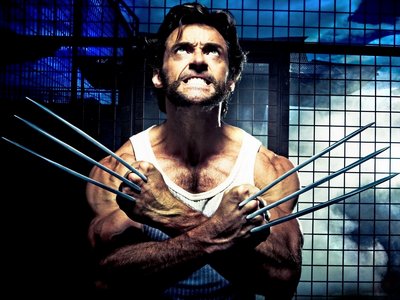
I also know that Wolverine was experimented on and that the government covered his bones in the adamantium metal to make him indestructible and they gave him his metal claws. The addition of the bone claws was silly and unnecessary. They looked like bad special effects and were never really used effectively. It would have been better for him to just have them added and have him trying to adjust to his new claws, which they ended up doing in a few funny scenes of him trying to figure them out and doing damage to a room instead. Also part of the operation lead to him having amnesia but since they chose to do the operation early on they left him with his memory and chose a pretty ridiculous way to make sure he lost his memory at the end of the film to keep in line with the timeline. The way they did it felt tacked on and forced. There must have been a better way to do it, but oh well.
The other thing I didn't like was the addition of so many other mutants, it felt like another X-Men film rather than just a Wolverine film. Most of the other characters they showed didn't really do much for the story but it was a way for the film makers to nod to the fans and say "look, here's Gambit!" Especially throwing in Cyclops wasn't necessary at all, it was just distracting. They should have kept it focused on Wolverine, Sabretooth, and Stryker and they could have told a really good and exciting story.
Despite all of my major complaints with the movie, I did actually enjoy it for what it is. Most Summer films are just mindless popcorn fun, and if you go in expecting that then you will be satisfied. As a long time lover of the franchise I just hope for a little more. Maybe because my expectations were dropped so low after all of the early reviews I ended up liking it more, but it was fine for what it is.
As for Angels & Demons I didn't have as much attachment to go on so I went in to the film pretty blind and I thoroughly enjoyed the movie.

I enjoyed the movie version of The Da Vinci Code but it felt a bit too clunky and forced at times. Some of the dialogue was campy, as was some of the acting despite a top notch cast, but they made it work. It was a fun puzzle to solve and took some ancient myths and added a new twist in an interesting way.
I never got around to reading the book Angels & Demons so I didn't really know what the story was about, but I knew the process was similar to The Da Vinci Code and I knew that it was also a prequel. The stories really do stand alone so it wasn't necessary to film them in any particular order. It's like a James Bond story, the character and formula are the same you just plug in the particular details.
Tom Hanks returns again as symbolist Robert Langdon who is brought to the Vatican to help with an urgent case. The Pope has died and the Bishops are about to meet for the conclave to select the next Pope, but four of the leading candidates are kidnapped and clues are left by an assassin claiming to be from the Illuminati, a group of scientist wiped out centuries ago by the church because their beliefs contradicted religion's laws. They have returned to exact their revenge and expose the truths of the church. Langdon must follow the symbols and clues to save the Bishops before a bomb of antimatter is detonated and destroys the Vatican and thousands of people.
There are parts of the story that are kind of far fetched, like a bomb of antimatter. It's a clever plot device that adds a sense of danger but you must suspend all disbelief in order to go with it since it's not possible yet to make that small amount of antimatter, or to even carry it around in a canister for that matter. I have no problem doing that, but when trying to instill some historic facts to the history of the Illuminati and add weight to their dispute with the church the bomb becomes a bit distracting. It takes away from the truth of the historic facts that are often buried in most teachings. The church has a history of doing some pretty nasty and out right evil things in order to further it's cause and gain followers. The real history of the California Missions is often left out so that the good of spreading the word of the Bible can be glamorized while the atrocities of the way people were forced to convert is buried and forgotten. During the time period the film refers to of the Illuminati being wiped out, many scientists or free thinkers who questioned the laws of the church were often silenced by unpleasant means. The Middle ages is often referred to as the Dark age for reasons of the horrible things that were being done across Europe as the word of God was being spread and people forced to convert. It's a period of our history that never gets fully taught but fascinates me and has caused some serious questions of not only my own faith but my thoughts on organized religion in general. Does it do more good than bad? Who is in the right in this film? Are the Illuminati, whether real or not, in the right to exact revenge and does the church have a right to defend itself or keep this silent?
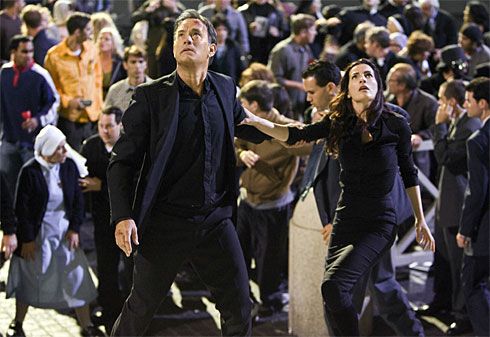
The time constraints of the characters helped enhance the tension and conflict and the suspense was well done. No time was wasted in exposition of the characters. What we needed to know we were able to discover along the journey so that the business of trying to save the Bishops could be gotten to right away. There was a good balance of action and quiet character moments and neither seemed to slow down the pace of the film at all. I did feel that the true threat behind the conspiracy was a bit predictable but it was also handled well enough to give me moments of doubt, but ultimately I knew who was behind the whole thing. That really didn't bother me though because the motives behind it all wasn't as obvious and it still left some mystery to the validity of the history between the church and the Illuminati.
Despite any quarrels I may have with the separation between history and fantasy that are mixed in this film, I totally understand it's a work of fiction and meant more to entertain rather than to educate. On that level this film succeeds. It's a good thriller with plenty of suspense and action mixed together nicely. The theme of religion and science being able to coexist and work together to educate is a worthy idea that needs to be explored more seriously in our culture. There are plenty of ideas expressed in the subtext of the story that peek my curiosity and invite me to further explore the history and mythology behind the plot. I hope it will encourage others to investigate the ideas and themes present in the film so that you can educate yourselves on the history and decide for yourselves what to believe. Like is suggested in the film, it really doesn't hurt to try and accept both ideas.
Overall I really enjoyed the film. There was some fascinating history given about the church, just as in The Da Vinci Code, but the plot seemed more dire and suspenseful in Angels & Demons. It's a good mystery and action film, just what you would expect from a Summer popcorn flick.
So I'm not really disappointed with what I've seen so far this Summer, but I'm also not blown away by anything. So far I would highly recommend Star Trek and The Brothers Bloom. I'm going to try and see Terminator this week and then I'll see if I can keep myself caught up. I highly doubt it, but it doesn't hurt to try. So leave me some feedback, what are your favorite Summer films so far? Is there maybe a small indie film I should check out? Until next time...




.jpg)
